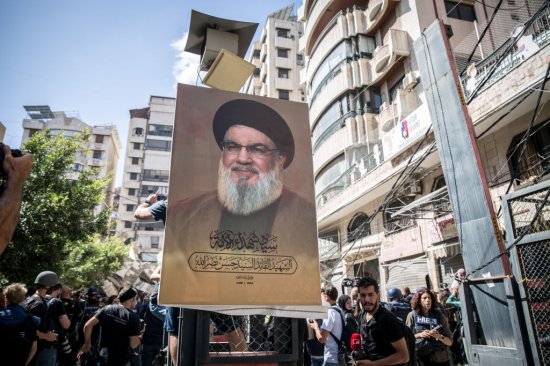
Amid fierce Israeli bombardment in Lebanon, Hezbollah has failed to unleash its most potent deterrents.
As Israel wages a campaign of airstrikes in Lebanon that is one of the fiercest in 21st century warfare, it’s not clear what, if anything, can stop it. Successive blows to Hezbollah, the biggest thorn in its side regionally, have discombobulated the militant group; it continues to fight, but seems unable to deter Israel’s sharp escalation.
Now Lebanese are waiting on tenterhooks to see the full extent of Israel’s aims in Lebanon, and how far Tel Aviv’s war machine will go. The death toll has reached more than 2,000 and as many as 1.2 million are displaced in a country of more than 5 million people.
[time-brightcove not-tgx=”true”]Before Israel’s recent escalation, Hezbollah and Israel had been locked in a tit-for-tat exchange of fire for almost a year. The group began firing rockets at Israeli positions on Oct. 8, 2023 in solidarity with Gaza.
Israel has been pressing since for a solution that would push Hezbollah back from the “Blue Line,” the de facto Lebanese-Israeli border, and allow tens of thousands of Israelis evacuated from northern communities to return home safely. Hezbollah said it would end its rocket fire only once a ceasefire in Gaza was reached. In the meantime, it believed its simmering conflict with Israel was under control, and within the so-called “rules of the game” that had held between Hezbollah and Israel since their last major war in 2006.
Hezbollah was clearly wrong. As Israel effectively ruled out a Gaza ceasefire, it chose to ramp up military pressure on Lebanon. Beginning on Sept. 18, Israel exploded thousands of booby-trapped pagers and walkie-talkies belonging to Hezbollah members and launched a devastating campaign of bombing on Beirut’s southern suburbs and Lebanon’s south and east. In targeted strikes, Israel also took out much of the group’s leadership, including Secretary-General Hassan Nasrallah. Now the Israeli military has launched a ground offensive into southern Lebanon.
Israel’s unrelenting military-intelligence campaign against Hezbollah has destabilized the group. Even as Israel’s attacks keep coming, Hezbollah has failed to mount an effective reprisal, or to unleash the precision-guided missiles that had been considered its most potent deterrent.
Israel’s ground incursion has reportedly encountered fierce fighting from Hezbollah, and at least eight IDF soldiers have been killed. But from the air over Lebanon, Israel can now seemingly bomb at will; whatever deterrence previously existed has broken down. Beirutis are forced to wait in suspense for official Israeli posts on X notifying them which buildings and city blocks will be struck. Several attacks have even targeted central Beirut. Elsewhere in the city, Israeli drones whir audibly overhead. In southern Lebanon, Israel has ordered residents to evacuate further and further north—now above the Awali river, more than 40 miles from the country’s southernmost point.
Read More: ‘We Can’t Predict What Israel Will Do.’ Inside the Fear and Chaos Gripping Lebanon
In an address following Nasrallah’s death, deputy leader Naim Qassem insisted Hezbollah will not cease fire or abandon Gaza. He also emphasized the group still possesses its arsenal of medium- and long-range missiles. Yet Hezbollah seems to have only employed these weapons sparingly, if at all. Has that been a conscious strategic choice? Or is Hezbollah too scrambled to use these arms?
Hezbollah’s more autonomous combat units will continue to fight Israel’s ground offensive. But no one knows, really, how thoroughly Israeli strikes have degraded these units and their military infrastructure, including tunnel networks. Now these forces are likely to come under withering Israeli bombing and artillery fire as the IDF attempts to push forward.
The key question is what Israel’s endgame might be. Israel may be trying to bloody Hezbollah and its popular base enough to try to dictate a lopsided diplomatic settlement over the Blue Line. But given major military gains in recent weeks, it may also be trying to impose a solution unilaterally—potentially occupying parts of southern Lebanon and turning the area into a depopulated buffer zone. It’s not clear, though, how that sort of buffer would end Hezbollah’s rocket and missile attacks on northern Israel, given that the group possesses long-range arms.
The U.S. is unlikely to restrain Israel’s military push against Hezbollah; in fact, it seems to be quietly backing it. Biden Administration officials maintain they have secured commitments that Israel’s offensive will be “limited,” but Israel has transgressed Biden’s red lines before.
Whatever the outcome of Israel’s ground offensive, Lebanon now faces an open-ended campaign of Israeli aerial bombing. Years of Israeli airstrikes in Syria suggest that, once Israel feels it no longer faces a real deterrent, it will strike suspected enemy targets as it pleases.
Lebanon was already disaster-stricken prior to the past 12 months—still reeling from one of the worst economic crises in modern history amid a years-long political vacuum. An unending Israeli war is the last thing the country needs.
TIME Ideas hosts the world's leading voices, providing commentary on events in news, society, and culture. We welcome outside contributions. Opinions expressed do not necessarily reflect the views of TIME editors.